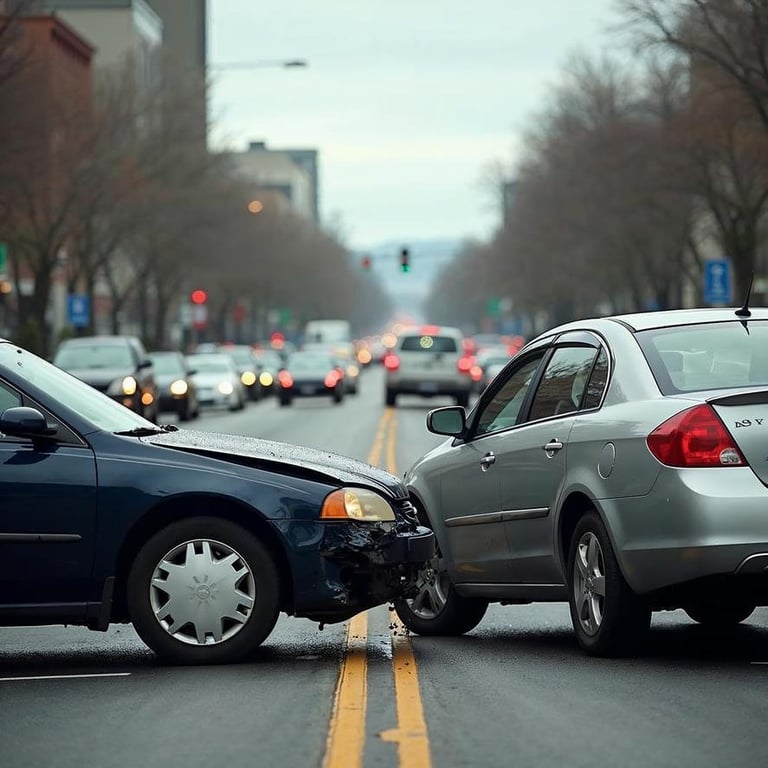
Unfortunately, based on your response, you may not qualify to file a claim. Most personal injury cases must be filed within two years of the accident, in accordance with the statute of limitations. Please consult with a licensed attorney to explore any possible exceptions or additional options.
Rear-end crashes are among the most common types of vehicle collisions experienced by drivers in Portland. These incidents occur when one vehicle strikes the rear of another, often causing significant property damage and personal injury. Understanding the effects of rear-end crashes can help drivers better prepare for the aftermath and navigate the claims process effectively.
Several factors contribute to rear-end collisions, including distracted driving, following too closely, sudden stops, adverse weather conditions, and mechanical failures. In Portland, traffic congestion on busy highways and urban streets can increase the risk of such accidents. Recognizing these causes is essential for drivers to practice safer driving and avoid potential collisions.
Rear-end collisions can result in a variety of injuries, ranging from minor to severe. Whiplash, a common injury in these crashes, occurs when the neck is suddenly jerked backward and forward. Other injuries include concussions, back injuries, fractures, and soft tissue damage. Immediate medical evaluation is crucial after a rear-end crash, even if injuries are not immediately apparent.
In most rear-end crashes, the driver who hits the vehicle in front is presumed to be at fault. However, liability can sometimes be disputed, especially if the lead driver made sudden or illegal maneuvers. Understanding your legal rights and responsibilities can help in managing your claim and seeking the compensation you deserve.
For a detailed guide on the claims process, consider reviewing this comprehensive rear-end collision claims guide which provides valuable insights relevant to Portland drivers as well.
After a rear-end crash, ensure that everyone involved is safe and call emergency services if needed. Document the accident scene thoroughly, including photos of vehicle damage, license plates, and any visible injuries. Collect contact information from witnesses and other drivers. Reporting the crash to your insurance provider promptly is also important to begin the claim process.
Accurate medical records are vital in supporting your injury claim after a rear-end collision. Keeping detailed documents such as doctor’s reports, treatment plans, and medical bills will assist in establishing the extent of your injuries. Learn more about the documents needed to support your claim effectively.
Insurance companies assess rear-end crash claims based on fault, damage, and injuries sustained. Compensation may cover medical expenses, lost wages, property repair costs, and pain and suffering. However, navigating insurance policies and negotiations can be complex, making it important to know what to expect and how to respond.
Drivers in Portland can reduce the risk of rear-end collisions by maintaining safe following distances, avoiding distractions, obeying speed limits, and staying vigilant in adverse weather. Educating oneself on safe driving practices promotes not only individual safety but also the safety of others on the road.
For further assistance on vehicle accident claims, refer to the detailed information on how to file a claim. This resource offers step-by-step guidance that can help injured drivers manage their claims more confidently.
Understanding the severity and consequences of rear-end crashes is key to protecting your rights as a driver. To learn more about vehicle safety and accident statistics, visit the National Highway Traffic Safety Administration for authoritative information and safety tips.
Rear-end crashes can have significant effects on drivers in Portland, from physical injuries to financial and legal implications. Being informed about common causes, necessary steps after a crash, and how to navigate claims can make a crucial difference in recovery and compensation. Safe driving practices and awareness remain the best defenses against rear-end collisions.
Unfortunately, based on your response, you may not qualify to file a claim. Most personal injury cases must be filed within two years of the accident, in accordance with the statute of limitations. Please consult with a licensed attorney to explore any possible exceptions or additional options.